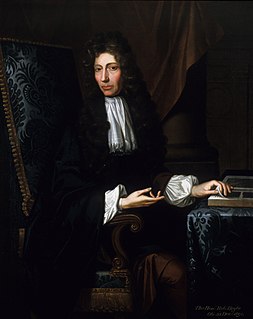Top 40 Quotes & Sayings by Robert Boyle
Explore popular quotes and sayings by an Irish philosopher Robert Boyle.
Last updated on November 23, 2024.
That there is a Spring, or Elastical power in the Air we live in. By which ?????? [elater] or Spring of the Air, that which I mean is this: That our Air either consists of, or at least abounds with, parts of such a nature, that in case they be bent or compress'd by the weight of the incumbent part of the Atmosphere, or by any other Body, they do endeavour, as much as in them lies, to free themselves from that pressure, by bearing against the contiguous Bodies that keep them bent.
I use the Scriptures, not as an arsenal to be resorted to only for arms and weapons, but as a matchless temple, where I delight to be, to contemplate the beauty, the symmetry, and the magnificence of the structure, and to increase my awe, and excite my devotion to the Deity there preached and adored.
And, to prevent mistakes, I must advertize you, that I now mean by elements, as those chymists that speak plainest do by their principles, certain primitive or simple, or perfectly unmingled bodies; which not being made of any other bodies, or of one another, are the ingredients of which all those called perfectly mixt bodies are immediately compounded, and into which they are ultimately resolved: now whether there be any such body to be constantly met with in all, and each, of those that are said to be elemented bodies, is the thing I now question.
And when with excellent Microscopes I discern in otherwise invisible Objects the Inimitable Subtlety of Nature's Curious Workmanship; And when, in a word, by the help of Anatomicall Knives, and the light of Chymicall Furnaces, I study the Book of Nature, and consult the Glosses of Aristotle, Epicurus, Paracelsus, Harvey, Helmont, and other learn'd Expositors of that instructive Volumne; I find my self oftentimes reduc'd to exclaim with the Psalmist, How manifold are thy works, O Lord? In wisdom hast thou made them all.
If the juices of the body were more chymically examined, especially by a naturalist, that knows the ways of making fixed bodies volatile, and volatile fixed, and knows the power of the open air in promoting the former of those operations; it is not improbable, that both many things relating to the nature of the humours, and to the ways of sweetening, actuating, and otherwise altering them, may be detected, and the importance of such discoveries may be discerned.
But the World being once fram'd, and the course of Nature establish'd, the Naturalist, (except in some few cases, where God, or Incorporeal Agents interpose), has recourse to the first Cause but for its general and ordinary Support and Influence, whereby it preserves Matter and Motion from Annihilation or Desition; and in explicating particular phenomena, considers onely the Size, Shape, Motion, (or want of it) Texture, and the resulting Qualities and Attributes of the small particles of Matter.
I look upon a good physician, not so properly as a servant to nature, as one, that is a counsellor and friendly assistant, who, in his patient's body, furthers those motions and other things, that he judges conducive to the welfare and recovery of it; but as to those, that he perceives likely to be hurtful, either by increasing the disease, or otherwise endangering the patient, he thinks it is his part to oppose or hinder, though nature do manifestly enough seem to endeavour the exercising or carrying on those hurtful motions.
And first, it seems not at all probable, That if the Omniscient Author of Nature knew that the study of his Works did really tend to make Men disbelieve his Being or Attributes, he would have given Men so many Invitations, and almost Necessities, to study and contemplate the Nature of his Creatures: Of these Invitations divers have been mention'd already, and more might be added to them, if we thought it requisite.
And let me adde, that he that throughly understands the nature of Ferments and Fermentations, shall probably be much better able than he that Ignores them, to give a fair account of divers Phænomena of severall diseases (as well Feavers and others) which will perhaps be never throughly understood, without an insight into the doctrine of Fermentation.
Acid Salts have the Power of Destroying the Blewness of the Infusion of our Wood [lignum nephreticum], and those Liquors indiscriminatly that abound with Sulphurous Salts, (under which I comprehend the Urinous and Volatile Salts of Animal Substances, and the Alcalisate or fixed Salts that are made by Incineration) have the virtue of Restoring it.

























